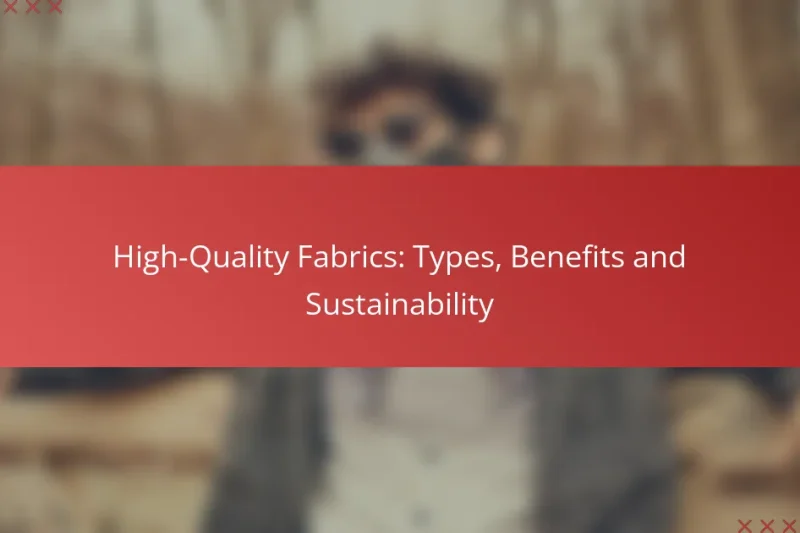Sustainable streetwear brands are redefining fashion by merging eco-friendly practices with contemporary style. With options like … Sustainable Streetwear Brands: Quality, Style and AffordabilityRead more
This guide explores the intersection of streetwear and sustainable fashion, highlighting brands that prioritize eco-friendly materials and ethical production practices. As streetwear continues to shape fashion trends, it plays a crucial role in promoting sustainability and encouraging consumers to make conscious choices. Discover the top brands leading the way in sustainable streetwear while maintaining a stylish edge.
Vintage Styles: Integration, Appeal and Modern Adaptation
Vintage styles have made a remarkable resurgence in modern fashion and home decor, seamlessly integrating classic … Vintage Styles: Integration, Appeal and Modern AdaptationRead more
Labor Rights: Influence on Streetwear Choices and Consumer Decisions
Labor rights play a crucial role in shaping consumer decisions within the streetwear market, as shoppers … Labor Rights: Influence on Streetwear Choices and Consumer DecisionsRead more
Consumer Awareness: Ethics in Fashion Purchases and Brand Responsibility
Consumer awareness plays a crucial role in promoting ethics in fashion purchases and brand responsibility. By … Consumer Awareness: Ethics in Fashion Purchases and Brand ResponsibilityRead more
Price Markups in Streetwear: Factors, Trends and Consumer Impact
Price markups in streetwear are shaped by various factors such as brand reputation, scarcity, and design … Price Markups in Streetwear: Factors, Trends and Consumer ImpactRead more
High-Quality Fabrics: Types, Benefits and Sustainability
High-quality fabrics such as cotton, linen, silk, wool, and cashmere provide unique benefits that enhance durability, … High-Quality Fabrics: Types, Benefits and SustainabilityRead more
Consumer Trends: Preferences, Behaviors and Sustainability
In recent years, consumer trends have shifted significantly towards sustainability, with shoppers increasingly favoring eco-friendly products … Consumer Trends: Preferences, Behaviors and SustainabilityRead more
Sustainable Streetwear: Budgeting Strategies and Cost Considerations
Sustainable streetwear offers a unique blend of style and environmental consciousness, but budgeting for it requires … Sustainable Streetwear: Budgeting Strategies and Cost ConsiderationsRead more
Seasonal Streetwear: Fall Essentials, Trends and Outfit Ideas
As the crisp air of fall sets in, streetwear essentials prioritize comfort and style, perfect for … Seasonal Streetwear: Fall Essentials, Trends and Outfit IdeasRead more
Fast Fashion Impact: Sustainability, Choices and Consumer Awareness
Fast fashion poses a significant threat to sustainability, particularly in the UK, by encouraging rapid production … Fast Fashion Impact: Sustainability, Choices and Consumer AwarenessRead more
What are the best streetwear brands for sustainable fashion?
The best streetwear brands for sustainable fashion focus on eco-friendly materials, ethical production practices, and transparency in their supply chains. Brands like Patagonia, Allbirds, Reformation, Stussy, and Adidas x Parley stand out for their commitment to sustainability while maintaining a trendy aesthetic.
Patagonia
Patagonia is a pioneer in sustainable fashion, known for its high-quality outdoor wear made from recycled materials. The brand emphasizes fair labor practices and environmental responsibility, often donating a percentage of profits to environmental causes.
When choosing Patagonia, look for items made from organic cotton or recycled polyester. Their Worn Wear program encourages customers to repair and recycle gear, extending the life cycle of their products.
Allbirds
Allbirds specializes in comfortable footwear crafted from natural materials like merino wool and eucalyptus tree fibers. The brand aims to minimize its carbon footprint through sustainable sourcing and manufacturing processes.
Consider Allbirds for everyday shoes that are both stylish and eco-friendly. Their carbon footprint labeling helps consumers make informed choices about the environmental impact of their purchases.
Reformation
Reformation is a women's fashion brand that combines trendy designs with sustainable practices. They use eco-friendly fabrics and have a transparent supply chain, providing information about the environmental impact of each item.
Shoppers can find dresses, tops, and activewear that not only look good but are also made with sustainability in mind. Reformation's commitment to reducing waste includes a recycling program for old clothing.
Stussy
Stussy blends streetwear culture with sustainable practices by incorporating organic materials and ethical production methods into its collections. The brand is increasingly focusing on reducing its environmental impact while maintaining its iconic style.
Look for Stussy's limited-edition pieces that highlight sustainable initiatives. Their collaborations often feature recycled materials, appealing to eco-conscious consumers who value unique streetwear.
Adidas x Parley
The Adidas x Parley collaboration focuses on creating sportswear from recycled ocean plastic. This partnership aims to raise awareness about ocean pollution while providing high-performance athletic gear.
When considering Adidas x Parley products, expect innovative designs that combine style and sustainability. The collection includes shoes and apparel that not only perform well but also contribute to environmental conservation efforts.
How does streetwear impact sustainable fashion trends?
Streetwear significantly influences sustainable fashion trends by promoting eco-conscious choices among consumers and brands. As streetwear gains popularity, it encourages a shift towards sustainable materials and ethical production practices.
Influence on consumer behavior
Streetwear has reshaped consumer behavior by prioritizing unique, limited-edition pieces that often emphasize sustainability. Many consumers are now more willing to invest in high-quality, eco-friendly clothing that aligns with their values.
Brands that incorporate sustainable practices into their streetwear lines often attract a loyal customer base. This shift is evident as younger generations increasingly seek transparency in production and are more inclined to support brands that demonstrate environmental responsibility.
Collaboration with eco-friendly brands
Collaborations between streetwear labels and eco-friendly brands are becoming more common, creating innovative products that appeal to environmentally conscious consumers. These partnerships often result in collections that use sustainable materials, such as organic cotton or recycled fabrics.
For example, notable streetwear brands have teamed up with companies specializing in sustainable textiles to produce limited-edition items. These collaborations not only enhance brand credibility but also raise awareness about sustainable fashion practices within the streetwear community.
What are the key features of sustainable streetwear?
Sustainable streetwear is characterized by its commitment to environmental responsibility and ethical practices. Key features include the use of organic materials, ethical production practices, and transparency in supply chains, all aimed at reducing the fashion industry's ecological footprint.
Use of organic materials
Sustainable streetwear brands often prioritize organic materials, such as organic cotton, hemp, and Tencel. These materials are grown without harmful pesticides or synthetic fertilizers, making them better for the environment and safer for consumers.
When shopping for sustainable streetwear, look for certifications like GOTS (Global Organic Textile Standard) or OEKO-TEX, which indicate that the materials meet strict environmental and safety criteria. This can help ensure that your clothing choices support eco-friendly practices.
Ethical production practices
Ethical production practices in sustainable streetwear involve fair labor conditions, safe working environments, and fair wages for workers. Brands committed to these practices often provide transparency about their manufacturing processes and labor policies.
To identify ethical brands, check for certifications such as Fair Trade or B Corp, which signify adherence to rigorous social and environmental standards. Supporting these brands helps promote a more equitable fashion industry.
Transparency in supply chains
Transparency in supply chains is crucial for sustainable streetwear, as it allows consumers to understand where and how their clothing is made. Brands that prioritize transparency often share information about their sourcing, production methods, and labor practices.
Look for brands that provide detailed information on their websites about their supply chain, including the origins of their materials and the factories they work with. This transparency can help you make informed purchasing decisions that align with your values.
How to choose sustainable streetwear?
Choosing sustainable streetwear involves evaluating brands based on their environmental impact and ethical practices. Focus on certifications, material sources, and the longevity of the products to ensure your choices align with sustainable fashion principles.
Assess brand certifications
Look for brands that have recognized certifications such as Global Organic Textile Standard (GOTS), Fair Trade, or OEKO-TEX. These certifications indicate adherence to specific environmental and social standards, ensuring that the products are produced sustainably and ethically.
Check if the brand provides transparency about its supply chain and labor practices. Brands that openly share their certifications and production processes are often more trustworthy in their commitment to sustainability.
Evaluate material sources
Investigate the materials used in the streetwear you are considering. Sustainable options include organic cotton, recycled polyester, and Tencel, which have a lower environmental impact compared to conventional materials. Aim for brands that prioritize eco-friendly materials in their collections.
Be cautious of synthetic fabrics that may contribute to microplastic pollution. Opt for brands that minimize the use of such materials or offer alternatives that are biodegradable or recycled.
Consider longevity and durability
Choose streetwear that is designed for longevity, as durable clothing reduces the need for frequent replacements. Look for quality stitching, robust materials, and timeless styles that won't go out of fashion quickly.
Consider the cost-per-wear approach; investing in higher-quality items may be more economical in the long run. Aim for pieces that can withstand wear and tear, ensuring they remain in your wardrobe for years to come.
What are the pricing ranges for sustainable streetwear?
Sustainable streetwear typically falls into three main pricing categories: affordable options under $100, mid-range brands between $100 and $300, and high-end labels above $300. Understanding these ranges helps consumers make informed choices based on their budget and values.
Affordable options under $100
For those seeking sustainable streetwear on a budget, numerous brands offer stylish choices under $100. These options often include basic tees, hoodies, and accessories made from organic or recycled materials.
Examples of affordable brands include Everlane and ASOS's sustainable line, which provide trendy pieces without compromising on ethical standards. Shoppers should look for certifications like GOTS or OEKO-TEX to ensure sustainability.
Mid-range brands between $100-$300
Mid-range sustainable streetwear brands typically offer higher quality materials and more unique designs, with prices ranging from $100 to $300. This category often features limited collections and collaborations that emphasize craftsmanship and sustainability.
Brands like Reformation and Patagonia fall into this range, providing stylish options that prioritize environmental responsibility. When shopping, consider the longevity of the pieces, as investing in durable clothing can reduce overall consumption.














